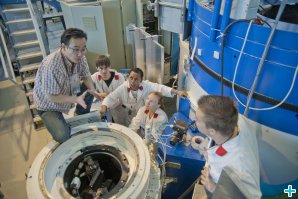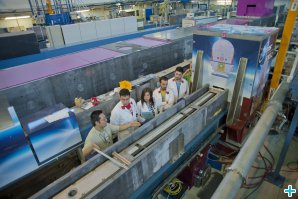15th JCNS Laboratory Course Neutron Scattering
September 5th to 16th - Forschungszentrum Jülich and FRM II, Garching
From September 5th to 16th 2011, the Jülich Centre for Neutron Science (JCNS) organised its annual Laboratory Course for Neutron Scattering. As previously, the lab course was held at two locations, Forschungszentrum Jülich for the lecture part and the reactor FRM II in Garching, close to Munich, for the experiments. The school was supported by NMI3 and will be every year for the next four years, as part as NMI3´s new ´European Neutron and Muon School´ project.
The lab course is open to students in physics, chemistry, and other natural sciences from all around the world. Participation is free of charge for the selected students, and travel expenses are reimbursed for foreign students. The course is part of the curricula of the Universities of Aachen and Münster. Financing came from Forschungszentrum Jülich with support from NMI3 and the European Network of Excellence SoftComp.
The first week of the neutron scattering course was dedicated to lectures encompassing an introduction to neutron sources, and presenting scattering theory and instrumentation. Fur-thermore, selected topics of condensed-matter research were addressed.
In the second week, eleven instruments at FRM II were made available for students’ training, including the neutron spin-echo spectrometer J-NSE, the backscattering spectrometer SPHERES and the small-angle scattering instruments KWS-1 and KWS-2. These world-class instruments were provided by JCNS, RWTH Aachen, University Darmstadt, University Göt-tingen, LMU Munich, and TU Munich.
This year we had 155 applications and accepted 54 students: 26 studying physics, 23 chemistry, and five students from biosciences and materials science. 22 students came from 15 foreign countries ranging from Europe to Asia. With 41% the fraction of female students was comparatively high, but did not reach the ratio close to parity of earlier years.
This year’s course was overshadowed by an unforeseen outage of the reactor. For that reason the experiments could only be performed as ‘dry runs’. Instead of working with actually collected data, the students had to use data stored from previous experiments. In most cases, this did not interfere too much with the didactical objectives. On the other hand the absence of radiation allowed the students to see parts of the instruments which in normal operation have to stay behind shielding as neutron guides, monochromators etc. Finally, the lack of activities was compensated by informative tours through the historical reactor FRM I conducted by Günter Aigner.
In two feedback sessions, the students gave an overall positive response despite the absence of neutrons. Especially, the introduction of exercises in groups for the lecture part was much appreciated. However, there were still complaints that the level of the lectures at the lab course was too high and the programme too dense.
The social programme consisted of a welcome party in Jülich and an admittedly more exuber-ant farewell party in Garching. The latter was enriched by a stunning dance performance of one of the students this year. Besides the welcome- and farewell parties, the ‘social pro-gramme’ included the annual soccer game Chemistry vs. Physics which was introduced in the programme in 2008. Due to a lack of a referee an exact score could not be reported this year.
The next JCNS laboratory course will take place September 3–14, 2012 following the same concept having the first (lecture) week in Jülich and the second (experimental) in Munich.

For more information about the shools supported by NMI3 please visit our Education pages.


